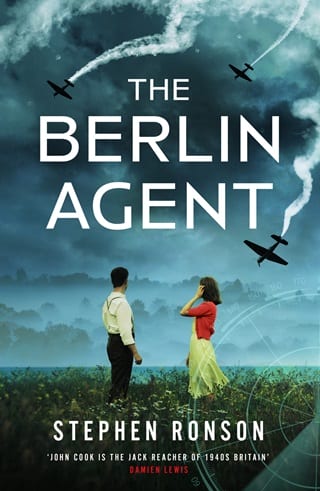57
We sat on the upper deck of the bus. Six of us, mixed in with the rest of the passengers, all of us studiously avoiding each other’s gaze. The bus slowly motored along the back lanes between Ringmer and Lewes, knocking overhanging branches and scratching against brambles growing exuberantly from hedgerows.
It was stifling. I opened the window as far as it would allow, but the air it admitted was as hot as the air already inside. If anything, the outside air was worse, filled with oily smoke from the engine.
We staggered our dispersal from the bus. Freddie and Kay rang the bell and got off at the Ringmer road. They’d have a ten-minute walk into town. Margaret and Miriam got off at the bottom of the hill, by the brewery. That left me and Constance. Vaughn had stayed behind. It was agreed by all that he was too high profile. If Lord Matheson were arrested with propaganda leaflets stuffed up his shirt the press would have a field day. Comparisons with Mosley would be unavoidable.
I watched from the upper deck as we threaded our way through the town centre, turning right to make the steep ascent of the high street. We got off by the castle gate, across the road from the records office.
My waistcoat felt stiff against my body. Constance had unpicked the liner to create a set of inner pockets. On my right, the pocket held a thin sheaf of leaflets. ‘A Jews’ War’. The same leaflet I’d seen at the pub. The left pocket bulged slightly. A waxed packet filled with wallpaper paste, and a thin brush. I wore a jacket over the waistcoat, despite the hot day.
It was late afternoon, and the crowds were thinning. People were on their way home, looking forward to their tea. The day’s market was over, and the road was littered with discarded leaves from grocer’s stalls, and straw and dung from now-dismantled animal pens.
The policeman who’d accosted me and Margaret on my last visit approached me, but thought better of it. I wasn’t with Margaret this time, but perhaps he didn’t want to risk a dressing-down from the unknown woman by my side.
I’d expected Constance to be furtive. We were committing treason. If we were caught, we’d spend the rest of the war in prison at the least. They were cracking down, that was the word. Before long, there’d be an execution. Keep people in their place. But Constance looked like every other woman striding along the pavement. Nothing out of the -ordinary. No worried looks around. She wasn’t even sweating, despite her large cardigan.
If anyone was going to give the game away, it was me. My heart was pounding, and I imagined everyone’s eyes on me. This was new territory. I’ve been over the top into the hell of no-man’s-land. I’ve been ten miles behind enemy lines in remote Waziristan. I’ve walked into a gang headquarters in Hong Kong and walked out the only man standing. But committing treason in my home country was beyond the pale.
We took a side street, a steep hill down towards the railway station. A man walked ahead of us, but he took out his key and let himself into a house. The door closed, and we were left alone.
‘The post box,’ Constance said.
A red post box, built into the wall, beckoned. I approached it. I was sweating heavily. I could smell the stink rising from my armpits. I was the picture of guilt.
‘I’ll whistle if anyone’s coming,’ she said, dropping back.
I reached into the right-hand side of my waistcoat and pulled out a leaflet. ‘A Jews’ War’.
‘Not too much paste,’ she said, keeping her voice low. I remembered the leaflets I’d seen in the toilets at the pub, sliding down the painted brickwork. Someone had rushed the job.
From my left inner pocket I pulled out the brush. I held the leaflet back to front against the bulging royal crest on the post box, painted and repainted every ten years. Victoria Regina. Thirty-nine years dead and her ghost still lingered on every street. I smeared paste on the leaflet, turned it round, and pressed it onto the red paint, covering the royal crest, the dead queen watching with disapproval.
Constance whistled. I hurried away from the scene of the crime.
‘Walk normally,’ she hissed, catching up with me as a young couple passed us in the opposite direction. I tensed as they passed. Were they undercover police agents? I felt the handcuffs on my wrists and imagined the shame Mum and Nob would feel seeing my picture in the paper. Traitor, it would say.
Ten leaflets took two hours and twelve attempts. Two abandoned after too many whistles. We went as far as Anne of Cleves’ house, back past the priory, towards the station, finishing up with a loop along the railway. The others had their own sections of town. I listened for police whistles that would tell us someone had been caught. If that happened we were to dump our materials and make our own way home.
By the time we got back to the bus station my neck and shoulders were solid, the stress of the afternoon reaching far into every muscle. I had a splitting headache, and I stank to high heaven.
‘It gets easier,’ she said to me, from five yards behind, as we hurried across the parking area towards our bus. I made sure nobody was watching and dropped the remains of the waxed paper and the brush in a litter bin. Finally, I felt a lightness I hadn’t felt since we’d set off earlier that afternoon.
‘Whatever it takes,’ Bunny had said. This kind of thing would presumably be a footnote to the kind of things he was up to. If this was his way of waging war, he could keep it. Give me a gun and an enemy who’s sworn to kill me, and let me get the job done.
We sat on the bus as it threaded its way back through the country lanes. I risked a look at my co-conspirators. Margaret’s hair was blowing in the breeze from her open window. She was as cool as a cucumber. She caught my eye and smiled. She was clearly a lot better at this kind of thing than I was. But that didn’t surprise me. Margaret was my better in most ways.
 Fullepub
Fullepub 



